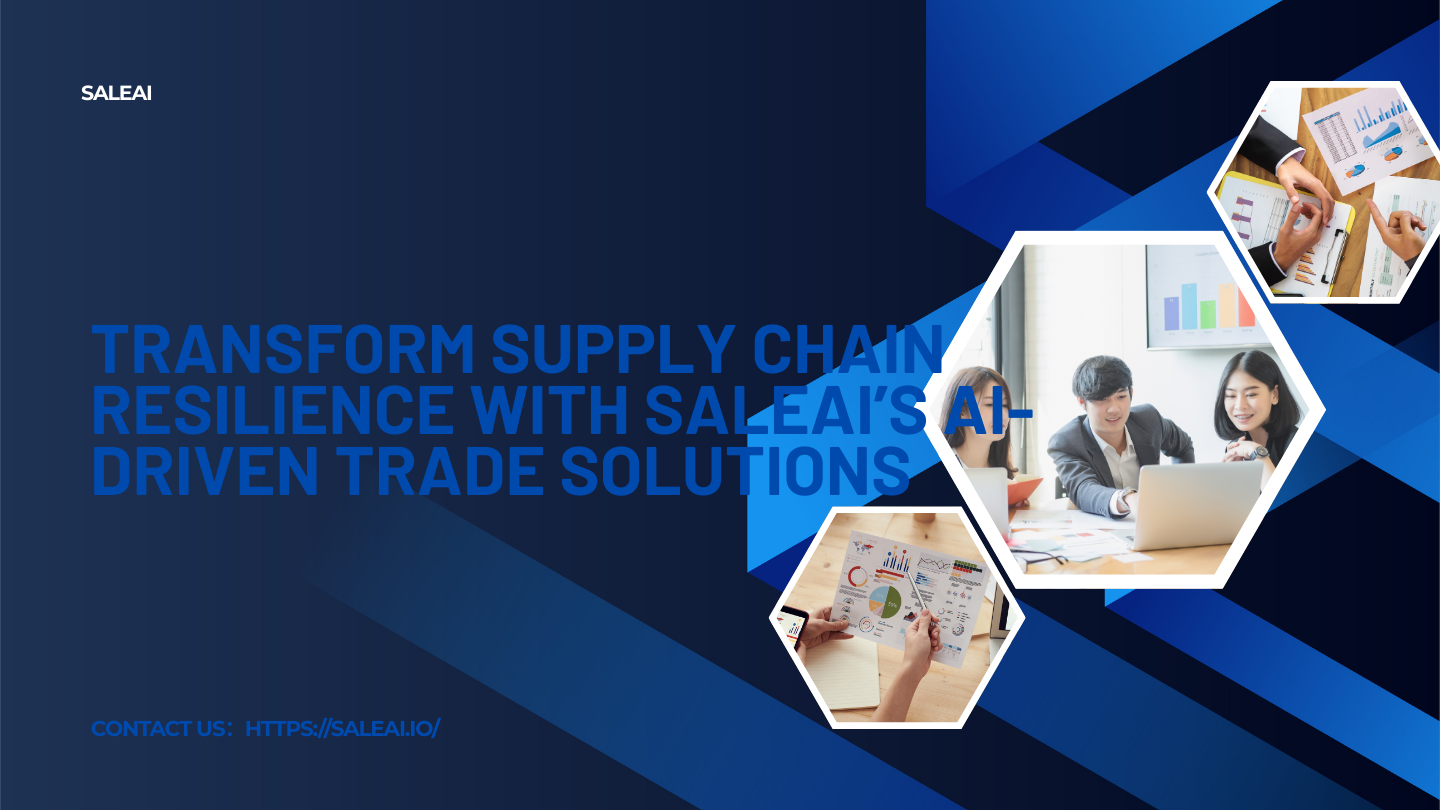Supply Chain Resilience: A Strategic Imperative
In a world increasingly shaped by uncertainty—be it economic volatility, geopolitical tensions, or natural disasters—supply chain resilience has become a critical focus for businesses involved in global trade. The ability to anticipate disruptions, adapt to challenges, and maintain operational continuity is no longer optional; it’s a business necessity.
But how can companies achieve this resilience? The answer lies in AI-driven trade solutions. With advanced tools like those provided by SaleAI, businesses can analyze data, forecast risks, and make proactive decisions to ensure their supply chains remain robust and agile.
Understanding Supply Chain Resilience
Supply chain resilience refers to the capacity of a supply chain to prepare for, respond to, and recover from unexpected disruptions. Building resilience involves not only mitigating risks but also creating opportunities for growth and innovation through enhanced visibility and agility.
Key elements of a resilient supply chain include:
- Risk Management: Identifying vulnerabilities and creating mitigation strategies.
- Agility: Quickly adapting to changes in demand, supply, or market conditions.
- Visibility: Gaining end-to-end insights into supply chain operations to make informed decisions.
- Collaboration: Strengthening relationships with suppliers, partners, and customers.
How SaleAI Enables Supply Chain Resilience
a. Enhanced Visibility with TradeLink AI Insights
SaleAI’s TradeLink AI Insights tool provides businesses with unparalleled access to trade data, enabling them to gain a comprehensive understanding of their supply chains.
- Customs Data Analysis: Access over 800 million customs records to track shipments, identify suppliers, and monitor global trade flows.
- Competitor Insights: Analyze the supply chain strategies of competitors to identify best practices or market opportunities.
- Demand Trends: Monitor product demand in key regions to align procurement and inventory strategies.
Example Use Case:
A consumer electronics company uses TradeLink AI Insights to monitor its suppliers’ shipment patterns. By identifying delays in raw material deliveries, the company proactively adjusts its production schedules, avoiding costly disruptions.
b. Risk Prediction and Mitigation
Anticipating risks is a cornerstone of supply chain resilience. SaleAI integrates predictive analytics into its platform to help businesses identify potential risks before they escalate.
- Risk Scenarios: Simulate the impact of disruptions, such as supplier shortages or geopolitical events, on supply chain operations.
- Supplier Evaluation: Assess the reliability and performance of suppliers based on historical data and industry benchmarks.
- Alternative Sourcing: Identify backup suppliers in different regions to mitigate the impact of localized disruptions.
Example Use Case:
An apparel brand uses SaleAI’s predictive analytics to forecast the potential impact of trade tariffs on its supply chain. By identifying alternative suppliers in tariff-free regions, the brand reduces costs and ensures uninterrupted production.
c. Optimized Resource Allocation with EnterpriseScope
SaleAI’s EnterpriseScope tool helps businesses identify key partners and allocate resources effectively.
- Supplier Profiling: Access detailed information about suppliers, including organizational structures, financial health, and contact details.
- Lead Prioritization: Focus on high-potential suppliers that align with your business goals.
- Collaboration Opportunities: Strengthen relationships with strategic partners to enhance supply chain flexibility.
Example Use Case:
A logistics provider uses EnterpriseScope to identify reliable shipping partners in emerging markets. By collaborating with these partners, the provider improves delivery timelines and reduces transportation costs.
d. Real-Time Collaboration with Automated Business Data
SaleAI’s Automated Business Data tool integrates data from multiple sources to create a unified view of supply chain operations.
- Data Integration: Combine customs records, supplier profiles, and market trends into a single dashboard.
- Collaborative Reporting: Share insights with internal teams and external partners to align strategies.
- Continuous Monitoring: Track supply chain performance in real time to identify bottlenecks or inefficiencies.
Example Use Case:
A pharmaceutical company uses Automated Business Data to monitor its supply chain in real time. When a delay occurs at a critical manufacturing site, the company quickly reallocates resources to maintain production schedules.
Benefits of SaleAI’s Trade Solutions for Supply Chain Resilience
1. Proactive Risk Management
By identifying risks early, businesses can implement mitigation strategies and minimize disruptions.
2. Improved Decision-Making
Access to real-time data and predictive insights enables businesses to make informed, strategic decisions.
3. Increased Operational Efficiency
Automation and optimization tools reduce manual workloads, improving overall supply chain performance.
4. Enhanced Collaboration
Stronger relationships with suppliers and partners lead to better coordination and mutual success.
5. Competitive Advantage
A resilient supply chain allows businesses to deliver products and services reliably, even in challenging conditions, strengthening their market position.
Industries Leveraging SaleAI for Supply Chain Resilience
a. Manufacturing
Forecast raw material demand, optimize production schedules, and manage supplier relationships effectively.
b. Retail and E-commerce
Ensure timely delivery of products to customers by mitigating supply chain disruptions.
c. Logistics and Transportation
Enhance route planning, improve delivery timelines, and reduce costs through data-driven insights.
d. Healthcare and Pharmaceuticals
Ensure the uninterrupted supply of critical medical products by building robust and flexible supply chains.
Why SaleAI is the Ideal Partner for Supply Chain Resilience
1. Cutting-Edge Technology
SaleAI leverages advanced AI and machine learning algorithms to deliver accurate, actionable insights.
2. Comprehensive Data Coverage
With access to extensive trade data and supplier profiles, SaleAI provides a holistic view of supply chain operations.
3. User-Friendly Platform
Designed for ease of use, SaleAI’s tools make complex data analysis accessible to businesses of all sizes.
4. Proven Expertise
SaleAI has a strong track record of helping businesses across industries build resilient supply chains.
5. Continuous Innovation
SaleAI continually updates its tools to address emerging challenges and opportunities in global trade.
Conclusion: Build a Resilient Supply Chain with SaleAI
In an unpredictable world, supply chain resilience is the key to maintaining operational stability and achieving long-term success. By leveraging SaleAI’s AI-driven trade solutions, businesses can gain the visibility, agility, and insights they need to adapt to changing conditions and seize new opportunities.
Whether you’re managing risks, optimizing resources, or collaborating with partners, SaleAI provides the tools you need to build a supply chain that drives growth and resilience. Start transforming your supply chain strategy with SaleAI today.





